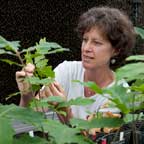Susan Brantley, Penn State – Hydraulic Fracturing Concerns
 Is fracking harmful to our planet or is it worth the economic boon it brings?
Is fracking harmful to our planet or is it worth the economic boon it brings?
Susan Brantley, a professor of geosciences at Penn State University, is studying the water in areas where fracking occurs.
Susan Brantley is a distinguished professor of geosciences and director of the Earth and Environmental Institute at Penn State. Her research interests include aqueous geochemistry, geochemical kinetics and, microbial biogeochemistry.
Hydraulic Fracturing Concerns

The process of hydraulic fracturing, commonly called fracking, is unearthing a new source of fuel in the United States. It extracts natural gas by injecting small concentrations of chemicals under high pressure into shale formations from 4 to even 10 thousand feet deep.
Controversy over the environmental safety near these gas well sites has divided the public over its costs and its benefits, and some have worried about the potential for injected chemicals to move into drinking water wells.
Our research study used a new and highly sophisticated technique to analyze water samples from homes near a reported well-pad leak.
The most reasonable explanation of our findings indicated that a highly diluted chemical mixture used in shale gas wells traveled more than 2 kilometers across natural fractures in the Earth’s rocky subsurface and entered drinking water wells.
We determined the source of the chemical mixture is likely from drilling additives or, possibly, fracking fluids. The source was not fracking itself, which occurred at 6 or 7 thousand feet deep, but leakage much nearer to the land surface during drilling, injection or storage.
For the first time, our study released data publicly that shows that compounds used in shale gas wells can move at relatively shallow depths and low concentrations into drinking water. This type of incident is extremely rare, but we want to learn how to avoid future problems.
Since the leak happened, Pennsylvania strengthened its requirements for design of gas wells. It is our hope that studies like ours will guide more improvements to environmental policies to refine drilling practices to better protect our water resources.
Read More: NY TIMES: Fracking Chemicals Detected in Pennsylvania Drinking Water



Sorry, but this sounds like a thinly veiled approval for fracking when terms like “extremely rare” are used. If the study concentrated on a small area how can such an extrapolation be valid?
There are many studies on which to build more comprehensive research. This is another. http://ehp.niehs.nih.gov/…/advpub/2014/9/ehp.1307732.pdf
It would be great to see a broad-reaching study of all the effects, at a range of distances from well sites, on contents of well water, air samples over time, health histories of those living in the area. It’s one thing to mention that the concentrations of these chemicals are dilute, but the fact often omitted (as it is in this report), is that it only requires trace amounts of many of these chemicals, and exposure over time to cause life-altering illnesses. The BTEX complex of chemicals alone that are found near compressor stations at gathering sites is a mix of carcinogens, neurotoxins and endocrine disruptors that people near these sites are never warned about as their being asked to surrender their land for these operations. Hopefully someone at Penn State is collecting all these discretely limited studies and piecing together an analysis of the cumulative effects to air, water, geology and human health.